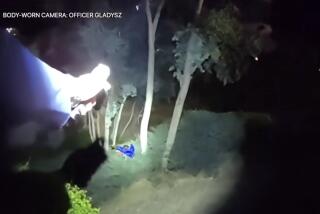1990 in Ventura County : YEAR IN REVIEW : Stun Guns : Suits Target Police
On Feb. 13, cardiac patient Duane Johnson began throwing himself against the walls of his room at Ventura County Medical Center to protest plans to transfer him back to a mental health facility.
Hospital officials summoned Ventura police officers, triggering an ongoing controversy about the use of stun guns by police.
Stun guns jar the nervous system with 50,000 volts of electricity. Defenders say they are often the best way--short of gunfire--to deter misbehavior.
But as the Johnson case illustrates, they can be lethal.
The two officers jolted Johnson seven to 11 times, according to a coroner’s report, even after he was tethered to a hospital gurney.
He died within minutes of the final application.
The autopsy attributed death to the stun gun applications, as well as to Johnson’s exertions and heart disease.
A district attorney’s investigator found that the officers had used “inappropriate and unjustified” force, but the agency declined to prosecute.
Four months later, a Ventura officer used a stun gun nine times on a driver who refused to get out of his truck for questioning.
It turned out that the 26-year-old man, Donn Christensen Jr., was coming out of an epileptic seizure and did not comprehend the officer’s commands.
Although the officer’s immediate superiors recommended dismissal, Chief Richard F. Thomas decided instead to suspend the officer for a month.
Thomas also revised the department’s policy on stun guns, saying they should be used defensively, not to force suspects to comply with orders.
Christensen sued the city and ended up accepting a $150,000 settlement.
Looking Ahead
Johnson’s parents filed a wrongful-death lawsuit against the city and county in September.
It did not specify an amount, but the family had filed claims of $2.5 million each against the city and county, which rejected them.
It may be years before the case reaches trial.
More to Read
Sign up for Essential California
The most important California stories and recommendations in your inbox every morning.
You may occasionally receive promotional content from the Los Angeles Times.










